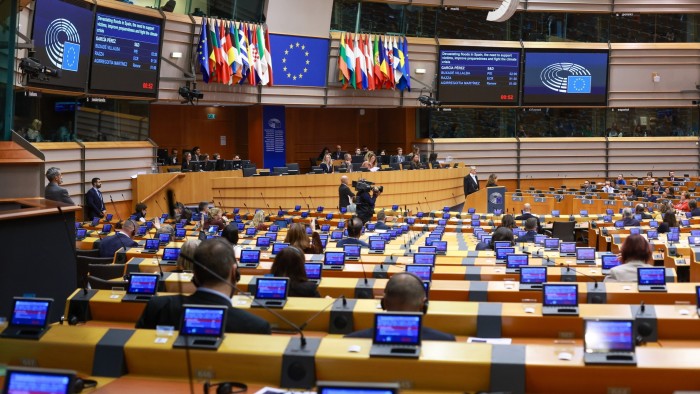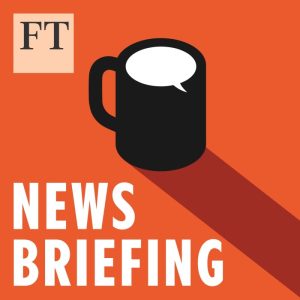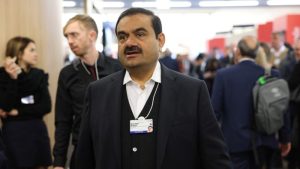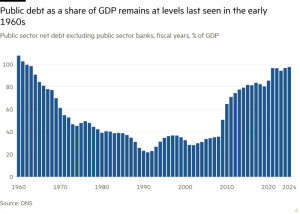How the European parliament reached a deal on the new commission

This article is an on-site version of our Europe Express newsletter. Premium subscribers can sign up here to get the newsletter delivered every weekday and Saturday morning. Standard subscribers can upgrade to Premium here, or explore all FT newsletters
Good morning. Today, our parliament correspondent unpacks the political sorcery that has finally allowed the new European Commission to actually start working, and Laura reports on plans to crack down on the almost half a million Russian visas still being issued by EU capitals each year.
At last
A deal in the European parliament has finally paved the way for a new, distinctly right-wing European Commission to take office on December 1, after the Socialists dropped their veto on two candidates, writes Andy Bounds.
Context: Parliament’s three biggest centrist parties — the Socialists, the European People’s party (EPP) and the Liberals — voted for Ursula von der Leyen’s second term as commission president in July. But they have since fallen out, bickering over von der Leyen’s new college of commissioners.
Yesterday, the three parties finally agreed to approve the final seven commissioners after some brinkmanship.
The Socialists had objected to Raffaele Fitto, a minister in Italy’s radical rightwing government, becoming an executive vice-president. Meanwhile, von der Leyen’s EPP tried to tarnish Socialist candidate Teresa Ribera, partly blaming her for mishandling Spain’s deadly floods while she was environment minister.
In the end, both got the nod, after some back and forth. Hungary’s Olivér Várhelyi from the far-right Patriots group is the only (partial) casualty, who will become health commissioner but lose powers over women’s health and pandemic preparedness.
The three parties renewed their wedding vows with a joint declaration outlining common policies. However, rather like a pre-nup for an open marriage, EPP officials made clear this does not prevent them from co-operating with the far right, for instance to unwind policies passed by the previous commission.
The Greens, whose supporting votes clinched von der Leyen’s re-election, have said they will decide on Monday whether to back her commission. It features just four Socialists and six Liberals, with almost two-thirds from rightwing or populist parties.
Bas Eickhout, co-leader of the Greens, told the FT: “We are in no way bound by this deal and this is a development that goes against what we have been fighting for since June.” He said there was a “fundamental problem” with allowing Fitto, who belongs to the hard-right European Conservatives and Reformists group, into power.
EPP leader Manfred Weber said he would work with whoever backed his attack on red tape, which he said would prevent far-right gains in the next elections. “I promised people a . . . Europe without bureaucracy and I will deliver. And if I do not deliver, then we will wake up in 2029 in an extremely populistic Europe,” Weber said.
Bickering aside, the final vote on the new commission on November 27 should be secured, paving the way for von der Leyen’s new regime.
Chart du jour: Pay packet

Wages in the Eurozone rose at their fastest rate since the 1990s in the three months to September, a 5.4 per cent jump that could complicate policymakers’ plans for more interest rate cuts.
Revisiting
Outgoing EU home affairs commissioner Ylva Johansson has said the visa rules for Russians coming to the EU might have to be revised, as member states continue to grant a “significant number” of entries, writes Laura Dubois.
Context: After Russia’s full-scale invasion of Ukraine, the EU hardened its rules for Russian citizens to enter the bloc, leading to a drop in issued visas. In 2023, Russians received around 448,000 Schengen visas, according to commission figures.
“It’s a significant number. So that concerns me,” Johansson told journalists yesterday.
The commission has published guidelines for member states on visas for Russians. “We will now have a dialogue with member states and look into how these guidelines have been implemented,” Johansson said. “It might be that the guidelines need to be a bit sharper.”
She also said that there were “huge differences” between countries, with those relying on tourism — mainly Italy, France, Spain and Greece — responsible for most of the visas for Russians.
Hungary has particularly been in the commission’s crosshairs due to a controversial fast-track visa scheme for Russians, which critics have warned may pose a security risk.
Johansson said this programme “is the wrong signal to send”. But she added that Hungary had addressed most questions raised by Brussels, assuring that Russians would undergo more thorough security checks “because they are coming from a country that is posing a higher security risk”.
Ultimately, she is happy to pass the baton on those tricky questions to her successor, Austrian politician Magnus Brunner. “It is, of course, not for me to take the decision, but I have initiated this possible revision of the guidelines,” she said.
What to watch today
-
European Commission president Ursula von der Leyen meets German vice-chancellor Robert Habeck.
-
EU trade ministers meet to discuss relations with the US.
Now read these
-
Olaf Scholz: The German chancellor faces his “Biden moment” as he comes under pressure from his own party to drop out of the election race.
-
Fragile France: Far-right leader Marine Le Pen has threatened to bring down the government if her party’s budget demands are not met.
-
Lay-offs: Ford plans to cut about 4,000 jobs in Europe as the carmaker grapples with slowing demand for electric vehicles and fierce competition from China.
Recommended newsletters for you
Trade Secrets — A must-read on the changing face of international trade and globalisation. Sign up here
Swamp Notes — Expert insight on the intersection of money and power in US politics. Sign up here
Are you enjoying Europe Express? Sign up here to have it delivered straight to your inbox every workday at 7am CET and on Saturdays at noon CET. Do tell us what you think, we love to hear from you: [email protected]. Keep up with the latest European stories @FT Europe
#European #parliament #reached #deal #commission





